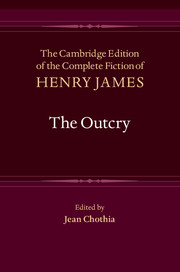Book contents
- Frontmatter
- Contents
- Illustrations
- Acknowledgments
- Abbreviations
- General Editors’ Preface
- General Chronology of James’s Life and Writings
- Introduction
- Textual Introduction
- Chronology of Composition and Production
- Bibliography
- The Outcry
- Book First
- Book Second
- Book Third
- Glossary of Foreign Words and Phrases
- Notes
- Textual Variants
- Emendations
- Appendices
VII
Published online by Cambridge University Press: 11 April 2021
- Frontmatter
- Contents
- Illustrations
- Acknowledgments
- Abbreviations
- General Editors’ Preface
- General Chronology of James’s Life and Writings
- Introduction
- Textual Introduction
- Chronology of Composition and Production
- Bibliography
- The Outcry
- Book First
- Book Second
- Book Third
- Glossary of Foreign Words and Phrases
- Notes
- Textual Variants
- Emendations
- Appendices
Summary
OUR young man showed another face than the face his friend had lately seen him carry off, and he now turned it distressfully from that source of inspiration to Lord Theign, who was flagrantly, even from this first moment, no such source at all, and then from his noble adversary back again, under pressure of difficulty and effort, to Lady Grace, whom he directly addressed. “Here I am again, you see—and I’ve got my news, worse luck!” But his manner to her father was the next instant more brisk. “I learned you were here, my lord; but as the case is important I told them it was all right and came up. I’ve been to my club,” he added for the girl, “and found the tiresome thing—!” But he broke down breathless.
“And it isn't good?” she cried with the highest concern.
Ruefully, yet not abjectly, he confessed, “Not so good as I hoped. For I assure you, my lord, I counted——”
“It's the report from Pappendick about the picture at Verona,” Lady Grace interruptingly explained.
Hugh took it up, but, as we should well have seen, under embarrassment dismally deeper; the ugly particular defeat he had to announce showing thus, in his thought, for a more awkward force than any reviving possibilities that he might have begun to balance against them. “The man I told you about also,” he said to his formidable patron; “whom I went to Brussels to talk with and who, most kindly, has gone for us to Verona. He has been able to get straight at their Mantovano, but the brute horribly wires me that he doesn't quite see the thing; see, I mean”—and he gathered his two hearers together now in his overflow of chagrin, conscious, with his break of the ice, more exclusively of that—“my vivid vital point, the absolute screaming identity of the two persons represented. I still hold,” he persuasively went on, “that our man is their man, but Pappendick decides that he isn’t—and as Pappendick has so much to be reckoned with of course I’m awfully abashed.”
Lord Theign had remained what he had begun by being, immeasurably and inaccessibly detached—only with his curiosity more moved than he could help and as, on second thought, to see what sort of a still more offensive fool the heated youth would really make of himself.
- Type
- Chapter
- Information
- The Outcry , pp. 110 - 116Publisher: Cambridge University PressPrint publication year: 2016

